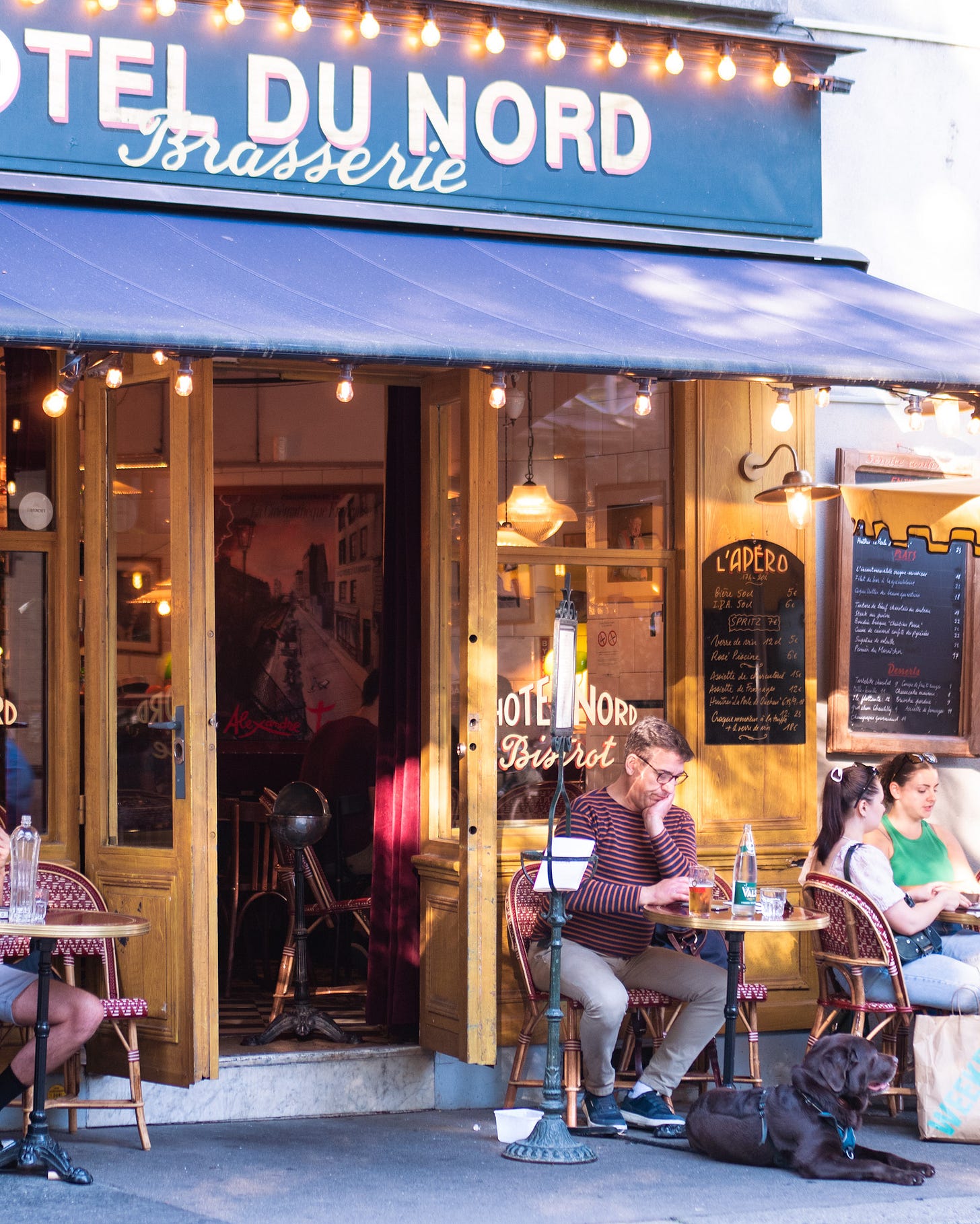Learning French in France- Part 1
My temperamental friendship with French + 3 takeaways to survive your French-learning journey
To tell you the truth, I have been sitting on this article for over 4 months now. When it comes to learning French, I have had too many false starts, ups and downs, brushes with different types of pedagogy and extremely non- linear progression. So, while I would love to tie it all in a neat little bow and tell you a straight and simple story, I cannot in all honesty pretend it has been anything but.
It’s not fair to you, and mainly, its not fair to past me who has lived through so many dull, and dark moments while trying to make friends with the French language. While she used to be an extremely hard-to-get-hold-of kind of acquaintance, our relationships has now morphed into a temperamental, and demanding friendship. Sigh!
So, I am starting a series on what its been like to learn to speak French in France. If you are curious about what it’s like to learn French while being immersed in the culture, you’re in the right place. Follow along if you want a partner to commiserate with. Or even better, write to me about your own struggles and pitfalls when it comes to learning a new language.
Now, here’s the reason (I think) I have been procrastinating this hard when it comes to writing about learning French. To be able to write earnestly and clearly about something, one needs to at least have a semblance of (physical and emotional) distance from the event. That’s what I have always felt anyway. But when learning a language, there is no such thing as completion. And hence, there is no such thing as ‘distance from the event.’
Therefore let us frame this series as a ‘work- in- progress,’ rather than a summary of past events. I will try to articulate the peaks and crests I have faced in my French journey while I am still very much in the thick of it. In this letter, I share a little bit about my progress in French, and 3 mindset shifts that have helped me cope with the psychological challenges of learning French.
Why learn French?
When I moved to Paris a little over 3 years ago, I did not speak even a lick of French. But I did learn the basic words and phrases to get by through Duolingo. So, right from day 1, I tried to only speak French to shop-keepers. And perhaps it is owing to this, I have not had a bad encounter with a vendor yet(Touches wood). Of course, marrying a French man helped me have additional information on how to navigate these social situations.
psst Here are some books and advice on Parisian etiquette if you are interested.
If you are just visiting or planning to live in Paris for an extended period of time without putting down roots, you can get by with a minimal amount of French. However, if you want to thrive and actually assimilate in French society, learning French is extremely important. Not just because for most jobs, you will be required to speak in French. But also, because so much of French culture, politics and the French way of life is tied to their language. Learn French, and you would be able to learn more about the people.
Seriously, my first lessons in French also became in a way, my first steps into being immersed in French culture, and getting to know more about what people are like, what they think and why they are such tough nuts to crack.
So, how much French can I speak?
The other day I had a surprising realisation. It was right after I got back home from dinner with a couple of friends. We had the whole dinner in French and not even once did I feel impeded, lost or unable to express what I wanted to say. It might have as well been a dinner in English. Needless to say, it was an emotional moment. I still cannot speak correct grammar, and my conjugations are all over the place. But what I realised is that I lost the fear of expressing myself in French. I have stopped being embarrassed of my mistakes, or being afraid of grossly mispronouncing words.
But even then, if someone is to ask me, “So now you speak French fluently?” I don’t really know what to answer. Technically, my French level is between B1 and B2. This implies I am able to understand and express thoughts, opinions and navigate regular social situations and contexts.
When it comes to more complex subjects, such as talking about intricacies of politics or breaking down the nitty-gritty of layered emotions etc, I am still not well- equipped in French. Yes, this means that with my still-limited French, I usually refrain from being a complex human being, choosing to remain simple. All my opinions distilled to being either black or white. I wish I was joking but I am not. Luckily, the French do love opinionated people so my current lack of nuance in French actually works out for me!
All this to say, the idea of learning French or living a life immersed in French throws open a ton of complex, complicated feelings. And while some days I feel clarity about it all, on others I am cloudy. More on all these in the coming instalment of this series.
Here are 3 things to remember when you first start learning French:
There are many kinds of French
Technically, there are three: standard French, formal French and informal French. While it might appear as if the separation between these different kinds might be clear and distinct, its not true. What might be informal French for one generation, might be seen as completely acceptable in polite society in case of another.
This difference in use of the language could even affect whether you get a job or not, or how people treat you. In France, people use language to decode social milieu you come from. Really, to a disturbing extent! Classism is well and firmly in place here. The written French you learn at school is also completely different from the French that is spoken in the streets or even between friends. The difference is as stark as swimming in a temperature-controlled pool versus swimming in open-waters!
This is why just progressing in French language school is not enough. It’s important to actually speak to real people in real situations for a holistic experience of the language. As someone who has always been good at school, it was one of the first bitter lessons I learnt. No amount of theory will help until you do the practice bit.
It’s not just what you know, it’s also what you feel
My feelings about my French tends to change according to my mood, the weather and even the time of day. Some days I could be on a roll, speaking raucously with everyone from the shop-keepers to my in-laws. Other days, I just have an exasperated, “I cannot French today,” feeling that’s just difficult to shake off.
I have heard similar sentiments from my friend who speak French fluently and have lived in France for way longer than I have. If your French is similarly, as I like to put it, moody, I would love to hear about it.
My comfort level in French also changes according to the people I am in conversation with. There are people who would make the space for you to speak French even as you fumble and trudge along slowly through your sentences. Keep them close! Then there are others who would correct your grammar mid-sentence while you’re in the middle of a serious conversation. Yes, it is annoying and impolite no matter how bad your French is. It’s normal to feel annoyed when you are not being heard or your space is not being respected. It’s not you or your French. Sometimes, its just the person you’re trying to talk to. But don’t let them dissuade you from speaking
Lastly, never compare your progress to someone else
Nothing grates me more than someone who says they just started learning French, and then you get to know they took French as a subject for a whole 5-years back in school. That is just utter rubbish framing of their foundation in French. This is exactly why you should never ever compare your progress with someone else.
It’s like when a casual runner starts training for a 10K, versus someone who never ran as a hobby ever trains for the same race. The previous person would have an advantage no matter what because their body is more conditioned than the latter. Even minor dabbling in something over a sustained period of time can aid in building the foundation for any skill.
So, never compare your progress with anyone else. My ‘unfair’ advantage in learning French is that I am technically a polyglot. Apart from French, I can speak, read and write 3 languages: English, Hindi, Assamese, while I can speak and read a 5th language: Bodo, which is the language of the tribe I belong too.
The languages above belong to a variety of language groups: Latin, Aryan, and Sino-Tibetan. This means that even before I learnt French, I already was exposed to a variety of sounds, words, pronunciation and grammatical and syntax rules. This can definitely help in picking up a new language. Much like everything else in life, we all begin language learning from different starting points, and we all have our advantages and disadvantages that make our journey uniquely personal. So, the only person you should compare yourself today, is to who you were yesterday!
In the next instalments from this series, I will talk about why I avoided learning French for a whole year, about the different stages of learning French, some of the major challenges I faced while learning French (ahem French people?) and what helped me to finally get over my fear of speaking French.









Bonjour.... I'm new to substack and new to learning French! I'm so glad your "letter" was sent to my inbox. I am eager to learn French and possibly relocate to a small southern town there. I enjoyed reading your story. It's refreshing to know that even with your multi-language background, you experience similar struggles and, more importantly, little wins! I love that you were so connected to your experience at dinner that language was not an issue! That is my goal... not necessarily to "be fluent"... instead to be "connecté". Cheers!
I love this, as someone with a non linear approach to learning French, largely dictated by how frequently I need to speak it I will be following this series keenly!